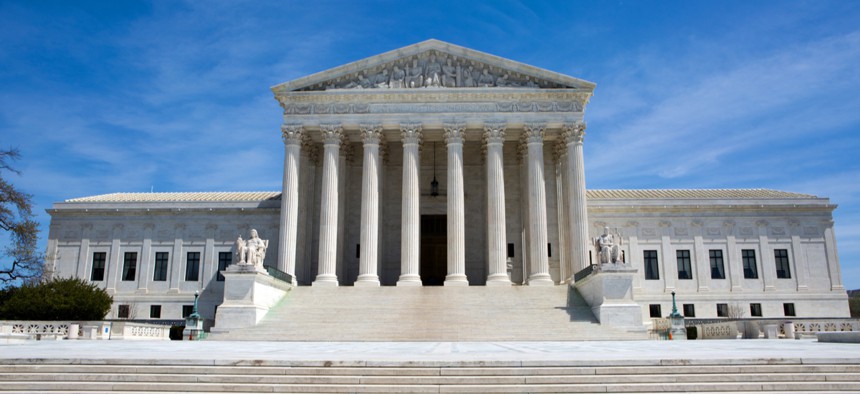Supreme Court Rejects ‘Contrived’ Defense of Citizenship Question on 2020 Census

Steven Frame/Shutterstock.com
The high court’s ruling called into question the Trump administration's justification for including the citizenship question but does not preclude the administration from asking residents whether or not they are citizens.
The U.S. Supreme Court on Thursday rejected the Trump administration’s justification for including a question about citizenship on the 2020 census, leaving in doubt whether it will be included on forthcoming census forms.
The complicated ruling sent the case back to the Commerce Department for further explanation but does not definitively preclude the administration from asking residents whether or not they are citizens.
Chief Justice John Roberts, writing for the majority, questioned Commerce Secretary Wilbur Ross’s stated reason for the inclusion of the question on the census, saying the administration’s explanation “seems to have been contrived.”
The ruling throws into doubt whether the administration can offer an adequate explanation to address the court’s concerns in time to include the citizenship question on the 2020 census. Census forms are set to go to print in the coming days, setting a tight deadline for the administration to meet. Census Bureau officials have said they have forms ready to be printed with and without the citizenship question.
President Trump said Thursday he had asked administration lawyers whether the census could be delayed in order to address the pending matters.
"Seems totally ridiculous that our government, and indeed Country, cannot ask a basic question of Citizenship in a very expensive, detailed and important Census, in this case for 2020," Trump wrote on Twitter.
The Department of Justice issued a statement indicating it "will continue to defend this administration’s lawful exercises of executive power.”
In 2018, Ross announced that the 2020 census would ask residents whether they are U.S. citizens, marking the first time the question would be included on census questionnaires since 1950. The Trump administration said collection of that data would enable the Justice Department to better enforce the Voting Rights Act, which protects minority voters.
A group of states and cities, including New York, challenged the legality of the Commerce Department’s move and asked the court to block the administration from including the question on the 2020 census. They argued that asking the question would deter participation and cause an undercount of residents in immigrant-heavy communities, potentially jeopardizing states’ access to federal funding.
Liberal and conservative justices agreed with differing parts of the ruling, with Roberts joined by four conservative justices in upholding the authority of the Secretary of Commerce to inquire about citizenship on the census.
But it was the court's four liberal justices who agreed with the core holding questioning the administration's explanation for the citizenship question.
“We do not hold that the agency decision here was substantively invalid. But agencies must pursue their goals reasonably,” Roberts wrote. “Reasoned decision making under the Administrative Procedure Act calls for an explanation for agency action. What was provided here was more of a distraction.”
Justice Clarence Thomas wrote in a separate opinion that the court's ruling incorrectly "invalidates an agency action solely because it questions the sincerity of the agency's otherwise adequate rationale." Justices Neil Gorsuch and Brett Kavanaugh agreed.
Roberts’ opinion said the administration’s rationale and the evidence presented in the case were at odds.
“In the Secretary’s telling, Commerce was simply acting on a routine data request from another agency,” Roberts wrote. “Yet the materials before us indicate that Commerce went to great lengths to elicit the request from DOJ (or any other willing agency). And unlike a typical case in which an agency may have both stated and unstated reasons for a decision, here the VRA enforcement rationale—the sole stated reason—seems to have been contrived.”
Although Thursday’s decision did not strike down the citizenship question outright, those opposed to its inclusion on the census cheered the ruling because they said it effectively blocks inclusion of the question on the upcoming census.
“Today’s ruling reaffirmed that block-level citizenship data is unnecessary for Voting Rights Act enforcement and threw the fate of this question in doubt,” said Irma Esparza Diggs, director of Federal Advocacy for the National League of Cities.
The 2020 census will be crucial in determining how hundreds of billions of federal dollars are divided among states and localities in the years ahead for programs that help provide money for highway construction, food stamps and health care for the elderly and the poor. Census data provide the bedrock on which formulas are based for distributing certain federal funds.
An undercount of just 1 percent of the population could have dramatic implications for state coffers. About 300 federal programs rely on census data to make decisions about the allocation of more than $800 billion a year in funds.
A report from the George Washington University Institute of Public Policy estimates that states lost out on approximately $1,100 per person missed in the 2010 census. A 1 percent undercount could equate to losses of approximately $292 million in Texas, $221 million in Pennsylvania and $177 million in Florida.
New York Attorney General Letitia James said the court’s decision means the census “will remain a tool for delivering on our government’s promise of fairness and equity, and states, like New York, will not be shortchanged out of critical resources or political representation.”





